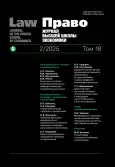Lien as a Procedural Security Measure in Insolvency Proceedings in Russia and Germany
- 作者: Shishmareva T.1
-
隶属关系:
- Kutafin Moscow State Law University
- 期: 卷 18, 编号 2 (2025)
- 页面: 219-244
- 栏目: Russian Law: Condition, Perspectives, Commentaries
- URL: https://journal-vniispk.ru/2072-8166/article/view/317618
- DOI: https://doi.org/10.17323/2072-8166.2025.2.219.244
- ID: 317618
如何引用文章
全文:
详细
The legal status of mortgagees and the specifics of meeting their claims in insolvency proceedings are of particular interest for research due to the privileged position of such creditors. However, the issue of bail is little studied in the Russian doctrine. The purpose of the study is to substantiate the legal nature of the right to arrest collateral and its priority in insolvency (bankruptcy) legal relations based on an analysis of legislation, doctrine and established judicial practice in comparison with the legislative model of the right to arrest collateral at the insolvency institute in Germany. The appeal to the legislation and doctrine of Germany predetermined the use of the method of comparative studies in order to understand the doctrine of the right of arrest bail and its consolidation in legislation. The historical and legal method is of no small importance for analyzing the legal structure of the right of arrest bail. The methods of interpretation, synthesis, and teleological method make it possible to identify the legislator’s goal of introducing the right of arrest bond. The German and Russian legal systems are quite close, especially in the field of property rights regulation, therefore, the German legal system is of particular importance for the implementation of successful legislative structures. First of all, the essence of the law of bail is investigated, which is the subject of discussion both in Germany and in Russia. The conclusion is made about the arrest pledge as having a public-legal nature of phenomena, in contrast to the right of pledge regulated in private law. A gap has been identified in the legal regulation of the status of a creditor from private law relations who secured his claims against the debtor by seizing his property in enforcement proceedings. It is recognized the priority established in the Tax Code of the Russian Federation for satisfying the claims of authorized bodies as creditors of an insolvent debtor in bankruptcy proceedings, based on the security function of seizing a taxpayer’s property, leads to a violation of the balance of private and public interests in the absence of the same right for bankruptcy creditors. It is proposed to regulate the grounds for the emergence of the right of arrest collateral, which has a special nature, in the Federal Law On Enforcement Proceedings, assigning priority to the holders of such a right and in bankruptcy proceedings with certain restrictions.
作者简介
T. Shishmareva
Kutafin Moscow State Law University
Email: TPSHISHMAREVA@msal.ru
ORCID iD: 0000-0001-7697-2533
参考
- Bevzenko R.S. (2017) Comments to decision of Judicial Collegium for economic conflicts of the Supreme Court of Russia 27.02.2017. Vestnik ekonomicheskogo pravosudiya=Bulletin of Economic Justice, no. 4, pp. 9–17 (in Russ.)
- Bork R. (2017) Einführung in das Insolvenzrecht. 8 Aufl. Tübingen: Mohr Siebeck, 301 S.
- Cherkasov D. Ya. (2020) Pledge priority of tax service claims in bankruptcy proceedings. Imuschestvennye otnoshenia=Property Relations, no. 12, pp. 79–85 (in Russ.)
- Egorov A.V. (2016) Pledge because of arrest in Russia and abroad. Vestnik ekonomicheskogo pravosudiya=Bulletin of Economic Justice, no. 9, pp. 84–103 (in Russ.)
- Gubalke K. (2022) Pfandrecht und Sicherungsrecht an beweglichen Sachen. Ein Rechtsvergleich des russischen mit deutschen Recht. Regensburg: S. Roderer Verlag, 206 S.
- Karapetov A.G. et al. (2017) Contractual and binding law: article-by-article commentary to articles 307-453 of the Civil Code of the Russian Federation. Moscow: Statut, 1120 p. (in Russ.)
- Karelina S.A., Frolov I.V. (2017) Realization of the collateral right from arrest in bankruptcy: issue of the privileged position of persons in favor of whom the arrest was imposed. In: Papers of scholar conference. Moscow: Yustitsinform, 483 p. (in Russ.)
- Kirichenko A.E. (2024) Overcoming the imbalance of interests of bankruptcy creditors, the fulfillment of obligations to which is not secured by collateral. Vestnik nauki=Bulletin of Science, no. 7, pp. 111–115 (in Russ.)
- Kukin A.V., Pleshanova O.P. (2023) Claims of mortgagees in bankruptcy cases: new clarifications of the Supreme Court. Zakon=Law, no. 6, pp. 113−125 (in Russ.)
- Lackmann R. (2021) Zwangsvolleckungsrechtm mit Grunzügen des Insolvenzrecht. Eine Einführug in Recht und Praxis. München: Vahlen, 448 S.
- Leonov M.R., Ponomarev O.V. (2021) Pledge from arrest in tax law: theory and practice. Finansovaya ekonomika=Financial Economy, no. 5, pp. 60–62 (in Russ.)
- Pleshanova O.P. (2023) Pledge in bankruptcy: development of legal positions. Sudia=Judge, no. 7, pp. 24–29 (in Russ.)
- Reischl K. (2011) Insolvenzrecht. München: G.F. Müller, 376 S.
- Schwartz M.Z. (2017) On so-called prisoner pledge. Arbitrazhnye spory=Arbitration Disputes, no. 2, pp. 109–124 (in Russ.)
- Suvorov E.D. (2017) Aspects of realization of demands secured by pledge under bankruptcy of proprietor of arrested property. Aktual’nye problemy rossiyskogo prava=Issues of Russian Law, no. 8, pp. 69−79 (in Russ.)
- Tereshchenko T.A., Ganyushin O.E. (2016) “Arrest pledge”: issues of law enforcement. Zakon=Law, no. 3, pp. 71–78 (in Russ.)
- Timashkova M.S. (2022) Competition of collateral creditor and tax when selling pledged property in a bankruptcy case. In: Current issues of law in the banking sector. Papers of International Legal Banking Forum. 2021. Samara: University, pp. 377–383 (in Russ.)
- Tokmakov M.A., Ozerov I.A. (2018) The issue of satisfaction of the secured claims in the bankruptcy case in the practice of the Supreme Court of the Russian Federation. Nauchnyi zhurnal akademii prava i eronomiki=Academy of Law and Economics Journal, no. 4, pp. 22–25 (in Russ.)
- Zweigert K., Kötz H. (1996) Einführung in die Rechtvergleichung auf dem Gebiete des Privatrechts. Tübingen: J.C.B. Mohr (Paul Siebeck), 729 S.
补充文件








